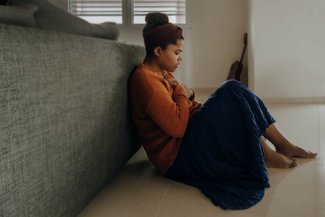
Underexamined and Underreported
Agenda Alliance's briefing on the links between intimate partner violence, suicidality (suicide attempts and suicidal thoughts), and self-harm.

13 Dec 2023
As we approach the close of the year, our Policy and Public Affairs Officer Tara Harris reflects on our policy work over the past year, and highlights key areas of focus moving into 2024.
Our policy work this year has explored a range of areas, from the criminal justice system to mental health; devolution policy to the cost of living. 2023 has been a difficult year for many people, but the impacts of wider societal events and discrimination are especially felt by women and girls with multiple unmet needs. We continue to promote the importance of co-producing all policy with women and girls with lived experience across our strategic areas of focus to ensure solutions meet and respond to need as they experience it.
We consistently uncover areas where the specific needs of girls and young women are overlooked, or at worst entirely forgotten, in the policy sphere. Mothers with multiple unmet needs are also impacted by policy concerning children and young people, which has been especially key to our work around the cost of living crisis.
Over 2023 we continued our Young Women’s Justice Project, in partnership with AYJ, which was initially launched in response to the lack of specific policy documents relating to the needs of girls and young women in touch with the criminal justice system. We’ve recently released a new briefing for the project, A Call To Action, which gives examples of best practice when working with girls and young women, and has a clear list of recommendations for government, funders, and practitioners.
Throughout the project, we have called for MoJ to develop their Young Women’s Strategy, as referenced in the Prisons Strategy White Paper (2021), and the Female Offenders Delivery Plan (2022). In our Call to Action we reiterate that this vital policy must be co-produced with girls and young women with lived experience, as well as ‘by and for’ organisations, to achieve lasting impact.
We’re pleased to see that the Young Women’s Strategy development is now in motion, and look forward to working further with partners on its development and introduction at a time when the criminal justice system has never been more stretched.
This year, the Government announced that from September 2025, working parents will be able to claim 30 hours of free childcare a week, over 38 weeks of the year, all the way through from nine months up to their child starting school.
Our research has shown that this announcement, whilst much needed for many families, will exclude many mothers with multiple unmet needs, especially those experiencing poverty. Just 20% of children aged three and four from families in the bottom third of earnings are eligible for the 30-hour entitlement, whereas 70% of parents who are eligible for the 30-hour offer are in the top half of earners. The prohibitive costs of childcare have been high on the news agenda this year, and we know that they disproportionately affect women. Mothers make up 90% of solo parents, and often are shouldering these financial burdens of childcare alone – and for women experiencing other intersecting needs, there are further prohibitive impacts of childcare responsibilities.
Our Transforming Services for Women’s Futures project, examining public services in the North East of England, found that 67% of mothers with multiple unmet needs that we surveyed reported that childcare responsibilities prevented them from attending key appointments.
Many of the women we spoke to who had experienced child removal emphasised that equitable childcare is critical to prevent the cycle of harm. We must see funding for childcare that supports all women and girls, including those experiencing multiple unmet needs such as poverty, domestic violence, or mental health issues.
Mental health provision has been a key focus of much of our work this year, particularly with the cost-of-living crisis disproportionately affecting women’s mental health.
Our report earlier this year, Underexamined and Underreported, analysed the links between intimate partner violence and suicide. This is particularly prevalent for women and girls, who report much higher levels of domestic abuse than boys or men.
Our recent briefing, A Call to Action, found that in 2022, the number of self-harm incidents in custody amongst 21 to 24-year-old women surpassed all other female age groups. It also found that over the previous four years, self-harm among this particular group of young women has been consistently rising.
The government’s new Suicide Prevention Strategy was published earlier this year and responds to a number of key policy areas which will have significant impacts on women, including the links between suicidality, domestic abuse and intimate partner violence.
Earlier this year we published new data which demonstrated these connections. Underexamined and Underreported found that:
Domestic abuse has wide-reaching impacts on women’s lives. An inquest returned the first ever conclusion of unlawful killing due to suicide, after Kellie Sutton took her own life following domestic abuse. Further stresses caused by domestic abuse, such as lengthy court battles for custody of children, often compound that distress and escalate mental health issues. Earlier this year we saw reports of at least three women taking their own lives as a result of the pressure of the family court system and fears for children who had been placed with abusers.
Recognising the clear link between domestic abuse and risk of suicide is a significant step for government suicide strategy, and we look forward to working with policymakers to ensure there is a joined up approach to implementing the strategic plan. You can read our response to the Suicide Prevention Strategy and a more in detail blog on our site.
Another key policy point was the King’s Speech in November, laying out the key focuses for Government for the next year. Reform to the Mental Health Act was widely expected – but we were very disappointed to see it left out. You can read our in-depth response to the speech here.
The Mental Health Act is 40 years old, and fails to provide adequate care to women and girls today. It is outdated and discriminatory, disproportionately impacting Black, Asian and minoritised people and denying people dignity and choices around their mental health.
We recently wrote two blogs on the specific ways women and girls are being failed by mental health care in the UK, which you can read here:
With the upcoming general election, we will be thinking about how best to engage with policy makers to ensure the voices of women and girls with multiple unmet needs are heard. We'll be engaging with our members to explore how wider themes of prevention and gender-specific policy-making can be prioritised, and would love to hear from you if you have any thoughts.
In 2024, some specific focus areas include:
If you’d like to be involved in our policy work, please contact us on policy@agendaalliance.org.

Agenda Alliance's briefing on the links between intimate partner violence, suicidality (suicide attempts and suicidal thoughts), and self-harm.

Mind and Agenda are calling for investment in tailored mental health support for women, following a £1.8m Tampon Tax-funded pilot programme of women-only peer support.

The Government's new Suicide Prevention Strategy published today is a welcome step but must be driven by a cross-sector commitment and properly resourced to improve the lives of women and girls with unmet needs.